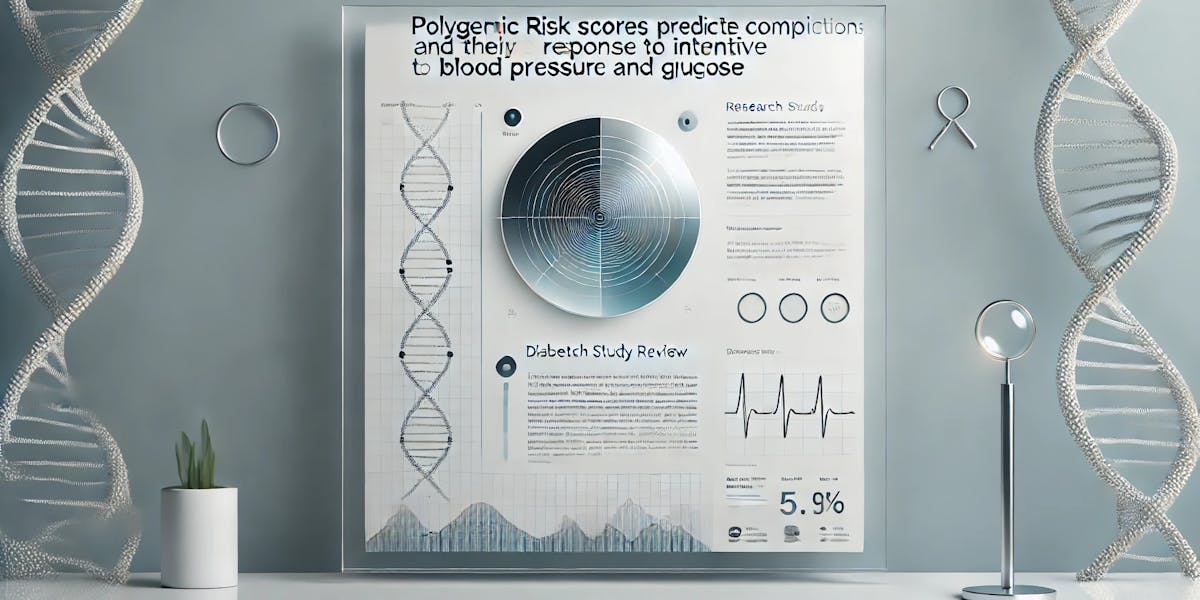Polygenic risk scores predict diabetes complications and their response to intensive blood pressure and glucose control
Journal Diabetologia

Summary
A multi-polygenic risk score (multiPRS) model was developed to predict diabetes complications and the efficacy of intensive blood pressure and glucose control treatments.
Study Design
Interventions
Study Type
Outcomes
Duration and Size
Study Population
Age Range
Sex
Geography
Other Criteria
Methodology
This study developed a multi-polygenic risk score (multiPRS) model integrating 10 weighted polygenic risk scores (wPRS) from genome-wide association studies. The model was validated using the ADVANCE trial (n=4098) and the UK Biobank dataset (n=17,604). Logistic regression was applied to predict microvascular and macrovascular outcomes in type 2 diabetes patients. Predictive performance was assessed through C-statistics and external validation.
Interventions
The study assessed the impact of intensive blood pressure and glucose control therapy on high-risk individuals identified by the multiPRS model. The ADVANCE trial intervention included perindopril-indapamide for blood pressure control and gliclazide MR-based glucose control targeting HbA1c ≤6.5%. Treatment effects were stratified based on polygenic risk classification.
Key Findings
The multiPRS model effectively stratified patients based on their risk of diabetes complications. Individuals in the highest genetic risk third benefited the most from intensive therapy, showing a 47% reduction in cardiovascular death with combined intensive treatment. The model achieved an area under the receiver operating characteristic curve (AUC) of 0.67 for major cardiovascular events and 0.72 for cardiovascular death.
Comparison with other Studies
The study "Polygenic Risk Scores Predict Diabetes Complications and Their Response to Intensive Blood Pressure and Glucose Control" by Lu et al. (2021) demonstrates that polygenic risk scores (PRS) can effectively identify individuals with diabetes who are at varying risks for complications and who may benefit differently from intensive therapies. This aligns with findings from other research. For instance, a study published in Scientific Reports in 2023 highlighted the clinical relevance of PRS in predicting type 2 diabetes and its complications, suggesting that incorporating PRS into clinical practice could enhance personalized treatment strategies. citeturn0search4 Similarly, research available on medRxiv in 2019 indicated that a novel polygenic prediction model could stratify individuals with diabetes into low and high-risk categories for complications, thereby improving the targeting of intensive therapies. citeturn0search6 Furthermore, a 2023 study in the European Journal of Preventive Cardiology examined the interaction between type 2 diabetes polygenic risk and physical activity, finding that the beneficial effects of physical activity on cardiovascular outcomes diminished among those with high genetic risk for type 2 diabetes. citeturn0search13 Collectively, these studies underscore the potential of PRS to refine risk assessment and guide personalized interventions in diabetes management.
Journal Reference
Lu J, Bi X, Wang H, et al. Polygenic risk scores predict diabetes complications and their response to intensive blood pressure and glucose control. Diabetologia. 2021;64(12):2691-2703. doi:10.1007/s00125-021-05491-7.
Related and Discussions
From Genotype to Phenotype: Polygenic Prediction of Complex Human Traits
Polygenic Risk Scores Predict Diabetes Complications and Their Response to Intensive Blood Pressure and Glucose Control
Polygenic Risk Scores Predict Diabetes Complications and Their Response to Intensive Blood Pressure and Glucose Control
Polygenic Risk Scores Predict Diabetes Complications and Their Response to Intensive Blood Pressure and Glucose Control
Polygenic Risk Scores Predict Diabetes Complications and Their Response to Intensive Blood Pressure and Glucose Control
Harvard Study reveals 72% of the US public approves selecting embryos based on DNA (polygenic scores) for likelihood of developing conditions and traits. What do you think?
Hi! We are researchers from the National Institutes of Health's National Human Genome Research Institute. Ask us anything about the All of Us Research Program.
"Individuals with common diseases but with a low polygenic risk score could be prioritized for rare variant screening", Lu et al 2020
Polygenic Risk Scores Predict Diabetes Complications and Their Response to Intensive Blood Pressure and Glucose Control
The Utility of a Type 2 Diabetes Polygenic Score in Addition to Clinical Factors for Incident Diabetes Prediction in a Rural American Indian Population
Defining Type 2 Diabetes Polygenic Risk Scores Through Multi-Trait Genetic Analyses
Integrated clinical risk prediction of type 2 diabetes with a multifactorial polygenic risk score
More data supporting that common variants of monogenic #diabetes genes increased risk for YOD and cardiovascular–kidney events.
For over 4 million insurees, 'free' polygenic risk scores for 8 conditions (including heart disease, multiple cancers, type 2 diabetes, ...
T2D polygenic risk score is associated with the onset of T2D in women with a history of GDM.
Using a candidate gene approach, a polygenic risk score derived from common variants of 34 monogenic diabetes genes was associated w/ young ...
Polygenic Risk Scores: Development, Validation and Applications
Michael Inouye, Polygenic Risk Scores and Their Use in the Clinic
Stay informed. Stay ahead.
Subscribe now for the latest breakthroughs, expert insights, and cutting-edge updates in diabetes care—delivered straight to your inbox.